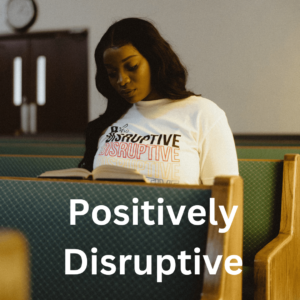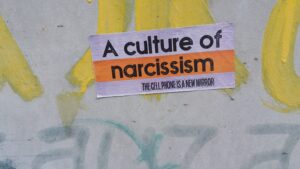How to be positively disruptive? That is what one of my clients asked me within the context of inspiring their team to be incredible. So what is ‘Positive Disruption?
The word disruption can be perceived as being a nuisance: certainly if there were disruptive students in a lecture, it would be off putting. Likewise in a team project where one person wishes to dominate the conversation and ideas, yet doesn’t listen to anyone else’s opinion – I am sure you have been there too!
The action of preventing something, especially a system, process or event from continuing as usual or as expected
Definition of Disruption from Cambridge Dictionary
Whilst there are situations where we need a system or process taking place, there are occasions where we need to review our systems – thus disrupting the norm. In the last 2 1/2 years we have been forced to disrupt work: with many people forced to work remotely. We have seen some of the benefits of more flexible work environments and have adapted to these challenges creating a new working world.
But this is all about being positively disruptive. The pandemic wasn’t a result of being positively disruptive, although some of the successes were as a result of seeing new opportunities and a vision for the future of work.
“A positive disruptor is someone who challenges current organisational trends and habits and strives to find positive alternatives. A positive disruptor is someone who seeks to uproot, re-plant and change the way we think, behave, conduct business, learn, understand and live out our daily lives.”
Many of us were educated to pass exams; to fit in; to succeed by getting the best marks. Not to disrupt. And we start at work expecting to work in the same way. BUT things have changed; work has changed and in order to progress and make a difference within your team, it is important to disrupt in a positive way. In his book Work Disrupted, Geoff Schwartz notes that the pandemic has accelerated changes in working styles and work environments. He states that we will be working more remotely or in hybrid teams. But crucially people will move from project to project and in order to build your reputation and career profile, you will need to adopt a positive disruptive mindset. Listen to Geoff Schwartz interviewed by Susan Heaton-Wright in the SuperStar Communicator Podcast.
What Positive Disruption is NOT. It is not ‘being more visible’; being disruptive for the sake or it, or even narcissistic. This is a business case for challenging existing norms, not making it about Me Me Me! And raising your profile by being a pain to work with. So put your phone away; this isn’t about selfies and self promotion.
So what could you do to be positively disruptive? Here are some ideas
Avoid echo chambers: It can be very easy to listen to views like your own. We are in a very divided world, where opinions are polarised; where there is a reluctance to debate other ideas. If we all have the same opinions, we don’t challenge people to think differently and to consider alternatives. Our social media, the news we read and listen to/watch is based on our preferences influences our thoughts and views of the world. And the media will filter our preferences. Challenge yourself to meet people with other views; to listen to their views. Don’t cancel them; don’t block them unless they are very offensive or aggressive. You might learn something; you might appreciate the insight into someone else’s experience.
Check your biases and stereotyping: It is really easy to fall into the trap of dismissing ideas and challenges because you are biased against the person. Perhaps you disregard the person; perhaps you don’t respect them because they aren’t as experienced; or they are less qualified; or you don’t like them. When we are working with others, it is easy to filter and ignore those we don’t respect. Make sure you are listening to all advice and ideas. Rather like moving out of an echo chamber, keeping an open mind is crucial to positively disrupt.
Challenge existing norms including systems and procedures: As I mentioned before, one of the significant ways we could be positively disruptive, is by challenging existing processes, systems etc. The “Why are we doing this?” or “Is this the best client target?” or even “could we do this more efficiently?” are exactly the questions you should be asking if you wish to disrupt established behaviour and systems. There is a difference between grumbling about everything you are doing and being constructive. Challenging an existing process because it is complicated or not very effective is invaluable insight for the team. If you say why it isn’t working and provide other ideas, it will start a great conversation. Be disruptive; provide value.
Be able to communicate vision and ideas with clarity: If you are challenging others’ thoughts and systems, being clear about what you say, makes more impact. If you have an idea, speak with focus and clarity. Consider how you are going to achieve that goal or vision. Be prepared to listen to others objections and provide solutions.
Create opportunities: Any positive disruptor doesn’t want be passively accepting work and waiting to be asked. They make their own opportunities. Not only do they seek opportunities for themselves, they see if there are business opportunities for the company.
Identify talent in others: This is never only about us. It can appear strange if we are wanting to be positive disruptors to be promoting others. However if there is not a culture of doing this in an organisation: that it is the same old people who are chosen or selected, you aren’t disrupting! You ARE positively disrupting when you are behaving in different way. Disrupting by creating a culture where you lift each other up; celebrate everyone’s contribution and success is going to change for the better! This could be everything from recommending others for opportunities, recognising and celebrating success and speaking positively about everyone’s contribution.
Be prepared to fail and learn: We learn from everything we do and this includes making mistakes and failing. Provided you don’t harm others and lose all your money or that of the company you work for, you will learn from your mistakes. But it is important to reflect on why something failed so you don’t make the same mistakes. There is a great podcast called “How to Fail’ where journalist Elizabeth Day interviews famous people on their failures. Listen here.
Be significant rather than mediocre: we have to show our value. This includes challenging existing norms and suggesting alternatives that Will work. If we are just in a role to do the minimum; to take our salary at the end of each month, you are mediocre. But you won’t be valued. Perhaps you wish to coast and of course that is your idea, but if you want to make a real difference, be significant. Step up. Challenge. Seek opportunities. Be awesome.
We offer a range of learning opportunities related to ‘How to be Positively Disruptive’ these include:
- Keynote speeches
- Masterclasses
- Workshops
- Virtual Speeches
- Virtual Workshops
- Breakout Workshops at conferences
If you would like to discuss this and other services we offer why not contact us



 Case Study: Delivering Virtual Workshop to a Global Professional Organisation
Case Study: Delivering Virtual Workshop to a Global Professional Organisation